The post Riding In Jeeps With Strangers In Macedonia appeared first on The Expeditioner Travel Site.
]]>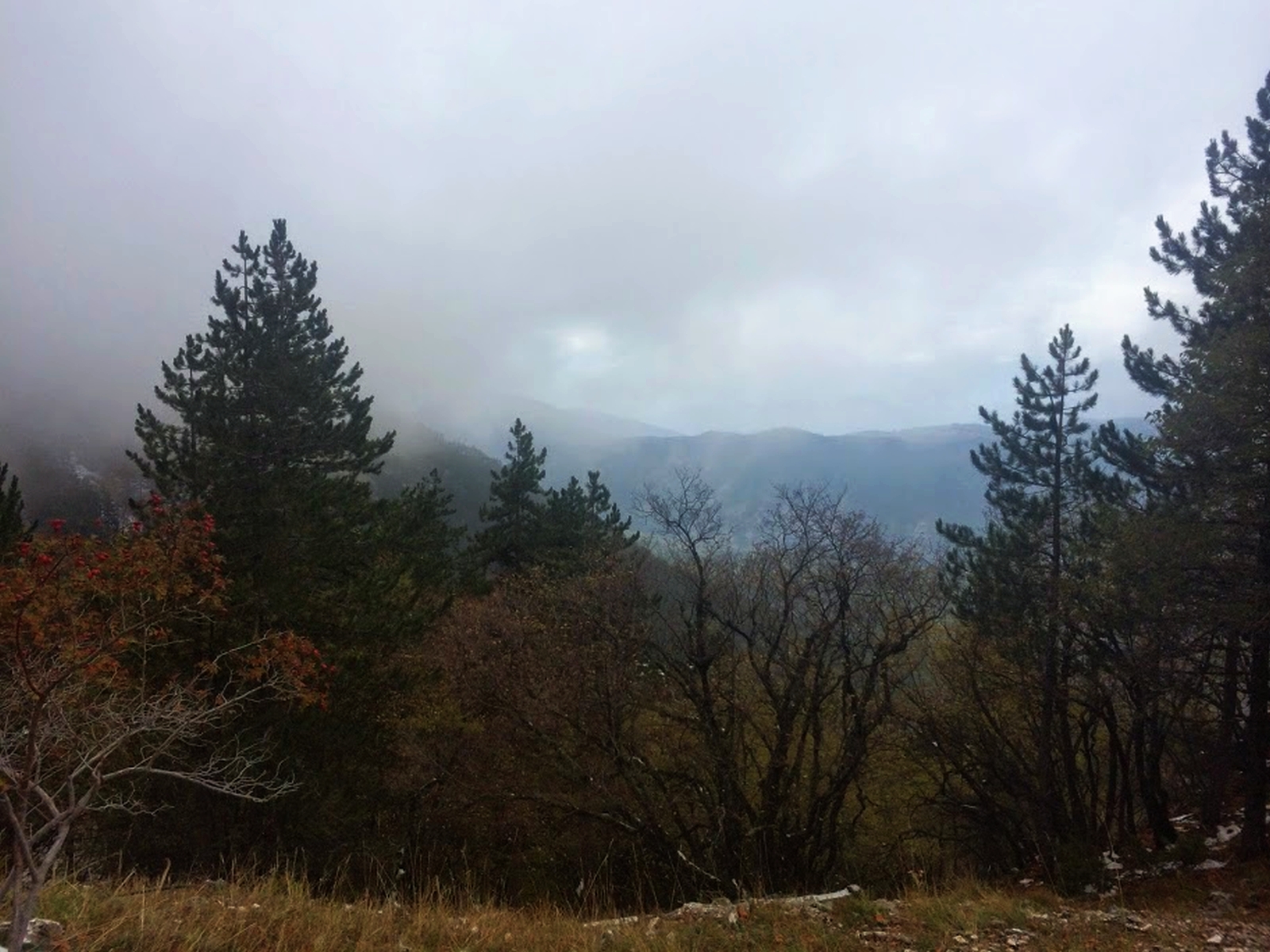
The Macedonia town of Skopje disappeared from the rear-view mirror of our jeep about 9 miles ago. The road has become narrower and is starting to wind back and forth. My stomach is doing flip-flops. I glance over at Oliver who I met just a couple hours ago and marvel at the fact that he’s steering the jeep with one hand while flipping through his phone with the other.
Even though it seems it’d be hard to maintain control of the jeep driving like that, it doesn’t occur to me to be scared. Oliver has probably driven this route countless times. He loves the gas pedal. He’s taking me straight into the Karadžica Mountains where we’ll meet up with Jebda, a hunting guide and park ranger at Jasen Nature Preserve.
My stomach lurches with every turn of the steering wheel. I rummage in my backpack for the motion sickness pills and quickly swallow two with a gulp of water. I decide to put the pressure point terry bracelets on too. I stare straight ahead even though the scenery on all sides is a dense autumn foliage mural in myriad shades of red and yellow.
Oliver is on the phone speaking Macedonian. He’s telling someone that we’re almost there and I hear the words for “mud,” “road,” “clouds” and maybe “bread.” He laughs with one of those amazing belly laughs that come from way deep down and suddenly we’re screeching to a halt on the side of the road. I notice that it’s really the side of a cliff and there are no guardrails in sight. It still doesn’t occur to me to be afraid.
I peer through the side window over the cliff and think I see rocks and dirt falling. If I were to open my door I’d step right into a big space of nothing. Oliver is making another phone call but this one is more difficult for me to understand. He may be talking faster or just using more slang phrases. He ends the call.
“Sorry,” he says, “I just needed to call ahead and make sure no one was coming down the road toward us.”
“What?”
“The road isn’t wide enough for two cars so I called to the rangers up ahead to see if anyone was on their way down the mountain. Wouldn’t want to end up careening into the abyss.”
“No,” I say, “but what if someone doesn’t know to call?”
“Oh anyone who would be driving on this road knows.”
I don’t say anything else. I’m pretty sure his plan is flawed. But, what the hell. We take off with a skid leaving gravel and dirt sputtering in our wake.
My motion sickness medicine has kicked in and I spend the rest of the ride watching the sun try and fight its way through the clouds and trees. Every once in a while, I am blinded by its rays and I find myself smiling.
“Where were you before Macedonia?” Oliver asks.
“Croatia, Montenegro, Albania,” I rattle off.
“Is Albania part of the European Union yet?” asks Oliver. “I know they want to be. Financially it would be a really positive thing for them. We want to be a part of the EU here too. Macedonia has applied for membership but it keeps getting blocked by Greece.”
“Greece? Why?”
“Well the official name of Macedonia is the Former Yugoslavia Republic of Macedonia, or FYROM. We don’t want to be associated with the former Yugoslavia Republic anyway. We want to be just known as Macedonia. Greece doesn’t want us to be called Macedonia. They think only their province of Macedonia should be called Macedonia. It’s ridiculous really.”
I’m not sure if province is the correct term as I don’t know much about Greece but Oliver is upset and animated and very sure. His voice has an edge to it now and I see that the guide persona has been officially cracked. I am now getting the native Macedonian who isn’t at all careful about what comes tumbling out of his mouth.
“That does sound rather absurd,” I say. “A lot of angst about the simple thing of naming something.”
“Yeah, It’s frustrating. Macedonia is often overlooked because it’s so small. We seem to be at a stalemate. Government officials meet and meet but no solution is found.”
“How long do you think it’ll go on?”
“Hard to say. It could be pretty close to forever. People are stubborn and don’t like change.”
Ain’t that the truth, I think to myself.
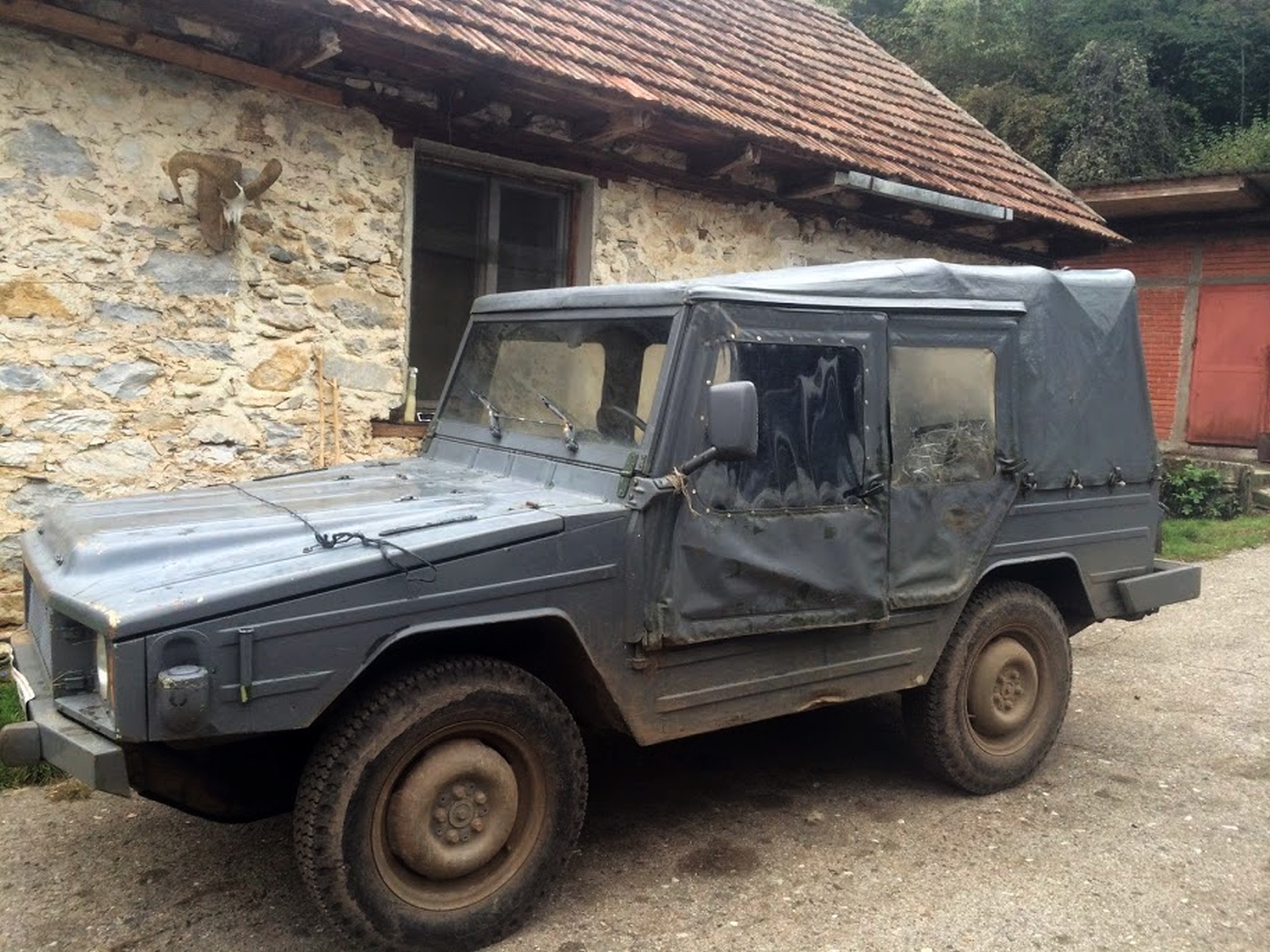
About halfway up the mountain, we’re heading down a short muddy incline toward something that is reminiscent of a stream. Oliver guns the engine and looks over at me with a grin. “Sometimes when it’s really wet, the jeep gets stuck here.” We don’t get stuck and the jeep powers up the opposite side of the riverbank.
There are a dozen or so stone houses with clay roofs up ahead. They all have neat rows of windows and two chimneys. We drive up to one that has a couple of large dogs lounging beside it and Oliver calls out for Jebda. A man emerges from the house dressed in four different types of camouflage with binoculars hanging around his neck and a rifle and backpack slung over his shoulder. He’s tall and burly and walks and talks with a measured steadiness. I can see why he would be a good hunter. Calm and patience radiate from him. He doesn’t really smile but it doesn’t matter. I smile enough for both of us.
We get back in the jeep and Jebda drives us to the trailhead. I again think about the fact that I’m off in the mountains in Macedonia with two men I’ve only just met and I try to remember if I posted anything online that morning that would lead someone to me if I were to never return. I’m not frightened as I think these things. It’s almost as if someone else is thinking them.
After 10 minutes we pull over and clamor from the jeep. We set off up the mountain. Jebda is in front, then me, then Oliver. The trail is steep and rocky. I watch Jebda’s feet and step exactly where he steps. Oliver and Jebda talk a little on the way. I find it strangely comforting to be in the middle of their words and feel safe and exhilarated at the same time. The mountain is quiet, vast and strong. Every once in a while Jebda stops and motions me forward to look at the view.
The peaks of the mountain disappear into a cloudy haze. It looks as if you could climb the mountain to the clouds and I wish we had the time to try. I know, though, that it’s much further than it looks. Clouds always are. Jebda hands me the binoculars at one point so I can watch a herd of mountain goats make their way down a cliff, sideways down an incline that seems to be at a 90-degree angle from the ground.
They never slip or falter and even from where I am I know they don’t have any fear. I realize that here, on this mountain, there doesn’t seem to be much fear. I think it was Jebda who banished it. There is something primal and simple about the man. It’s not simple in an unintelligent way, but simple in a way of existing with the mountain and other creatures, in the way his feet always know where to step just like the goats; in the way he can sense without turning around if we are lagging behind and need a break.
We’ve been hiking for a couple hours and the ground is slippery with snow. Oliver falls behind me and we come to a stop in the turn of a switchback. Jebda shakes his head and points to Oliver’s boots. They exchange a few sentences. The only word I know is the one for snow, which for some reason strikes me as funny and I laugh to myself.
“So,” Oliver says, “Jebda thinks we shouldn’t go too much further because I don’t have the proper footwear. You do though. He says your boots are good.”
This fills me with great pride. We trudge forward and up for about another 20 minutes. We’ve reached a plateau with a tiny wood primitive hunting shack.
“In the summer,” Oliver says, “the hunters will sometimes spend the night in this shack.” It has two sets of bunk beds, a tiny wood stove in the corner, and an old leaning cabinet that appears to have a few chipped plates and cups, a kettle and some pieces of soap. We set our packs down to rest and Oliver says that Jebda will carry them all on the way down since it’ll be a bit treacherous.
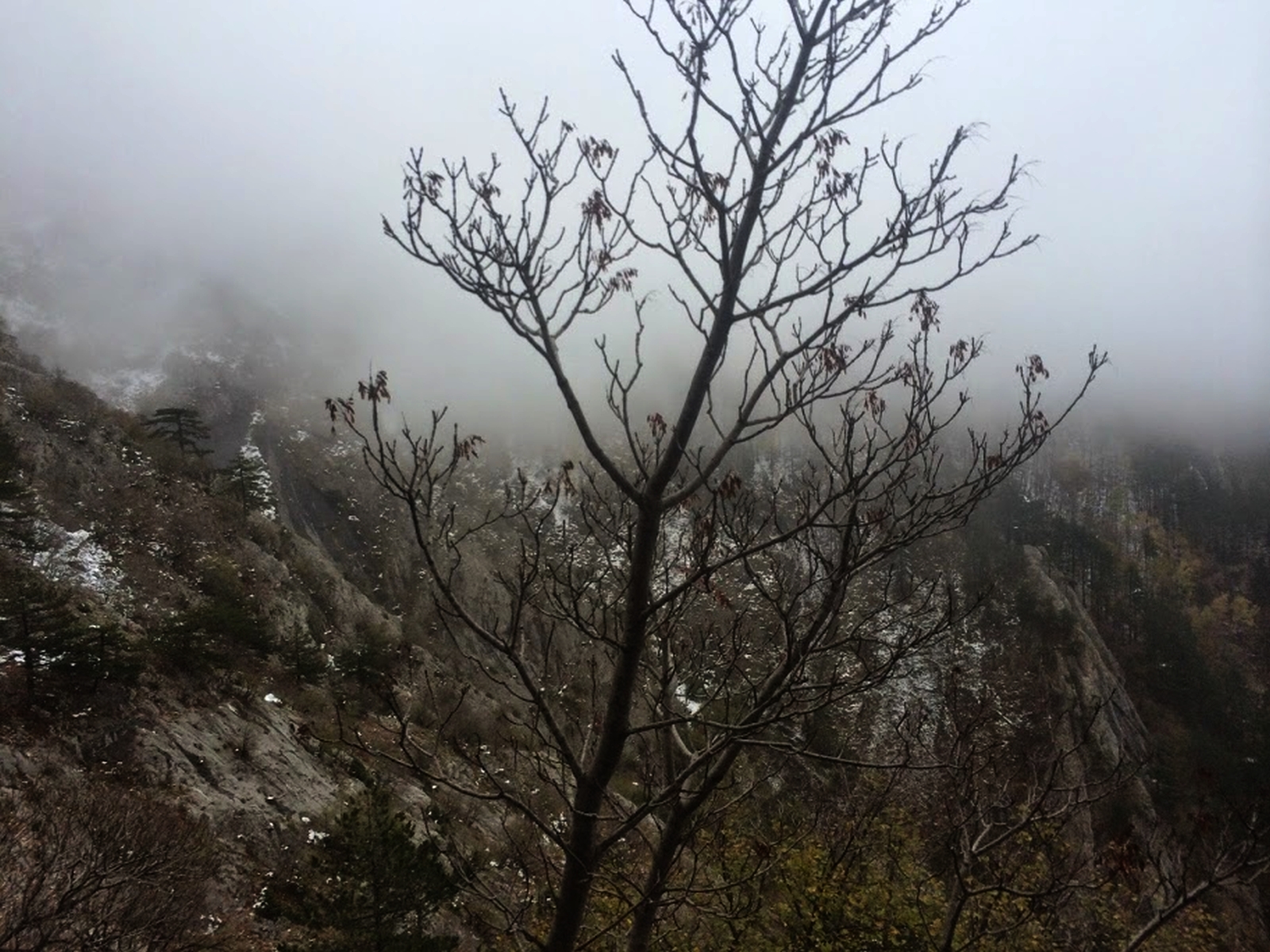
Jebda has gone around to the back of the shack and calls for us to join him. We make our way through the snow and are met with another view of the mountain. There is one small ray of sun making it through the mist and Jebda is standing in it. His eyes are focused far across the ravine to something I can’t see. There is love and calm and something I can’t name in his eyes and, again, I am struck by the simplicity of it.
The three of us stand in silence, watching the trees wave in the wind and the clouds swirl around the craggy peaks of the mountains. The quiet is soft and true and I think about my feet rooted to the snowy, rocky ground beneath me as if I have sprung from the earth. Then I realize that I have, that we all have. We come from the earth and the stars. Standing here on the mountain in the sky is the closest we get back to that beginning while still living. I want to stand there forever.
Oliver is the one who breaks the spell. “We should be going,” he says, “my feet are freezing.” Jebda and I both slowly step away from where we have been standing.
Coming down is easier than going up and none of us fall. I am still under the spell of the mountain and don’t say anything. We pile back into the jeep and Jebda hands out sandwiches. We eat in comfortable silence and drive back to the lodges. We climb out and Oliver turns to me smiling, “I hope you enjoyed the hike. You know, you are our first American tourist.”
“What? Really?” I reply.
“Yes,” he says. “If you had given me more warning that you were coming, Jebda might have carved you a plaque.”
I look from one to the other. Jebda looks sheepish and Oliver just looks happy, giddy even. I realize that this is a big deal for them and that Oliver is at least partially serious about the plaque thing. I can’t stop smiling and I think what a perfectly wonderful problem that is: to be unable to stop smiling. I suspect they know that my smile is a huge thanks.
“We should get going,” Oliver says. I ask Jebda for a photo and he agrees. Oliver takes it. I turn to thank Jebda. He suddenly gruffly hugs me and smiles.
“Come back soon,” he says in English.
Oliver lets out a loud laugh and slaps him on the back. “Jebda never speaks English,” he says to me. “He must really like you.”
I hug the mountain man one more time. Oliver and I get into the jeep. Jebda watches us go, waving. I look out the back window until he disappears from view. Oliver and I are both quiet for the hour drive back to Skopje. I’m trying to hold onto the feeling of being connected and grounded with the earth for as long as I can. Oliver pulls into the bus station and turns to me.
“Thanks so much for coming,” he says.
“Thank you for taking me.”
“Thank you for being such a good guest.”
“Thank you for picking me up and dropping me off at the bus station.”
We thank each other for about 10 more minutes before I start to open the door.
“You can come back any time,” he says, “and, don’t worry, the mountain is part of you now, it will always be. It always was.”
I nod and slide from the seat to the concrete. My feet land with a soft plunk onto the ground and I realize he’s right. We did not come into this world. We came from it.

/
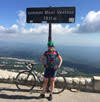 Vanessa is a solo traveler, cyclist, runner, and writer based in New York City. In her spare time she works as a tailor and pattern maker for television shows and movies. She is the granddaughter of a dairy farmer who was the son of a dairy farmer who was the son of a dairy farmer, an Amish woman, a woodworker from Ribnica, Slovenia, and a farm girl from Medvode, Slovenia. Like Anne Frank, she continues that most people are good at heart. She loves all the mountains. And she knows how to milk a cow. You can follow her adventures on her Instagram here.
Vanessa is a solo traveler, cyclist, runner, and writer based in New York City. In her spare time she works as a tailor and pattern maker for television shows and movies. She is the granddaughter of a dairy farmer who was the son of a dairy farmer who was the son of a dairy farmer, an Amish woman, a woodworker from Ribnica, Slovenia, and a farm girl from Medvode, Slovenia. Like Anne Frank, she continues that most people are good at heart. She loves all the mountains. And she knows how to milk a cow. You can follow her adventures on her Instagram here.
The post Riding In Jeeps With Strangers In Macedonia appeared first on The Expeditioner Travel Site.
]]>The post Memoirs From Macedonia appeared first on The Expeditioner Travel Site.
]]>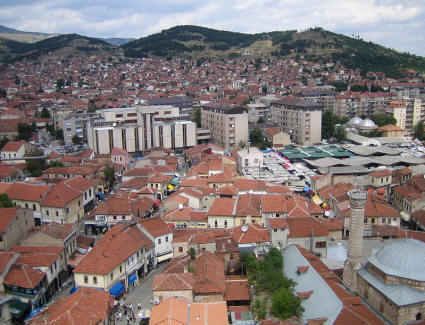
How the ancient city of Bitola, Macedonia, has preserved its ancient raditions and culture — a rarity in modern Europe
By Anna Kosmanovski
Many people reach a time in their lives when they feel a need to find out where they came from and to see their countries of affiliation. For many this may be a pleasant afternoon in Scotland taking tea with a Great Aunt Mary, but for me this involved flying over the sharp Balkan Mountains and travelling to Bitola, the southernmost city in Macedonia (formerly Yugoslavia). My Great Aunt Marys are babushka-style old ladies who speak a strange language and offer homemade, ripened wine. Aghast at your skinny wrists, they will shake their head sadly before forcing you to consume munja (traditional paprika flavored lamb) and potato stew (cabbage stuffed with rice) or hopefully both.
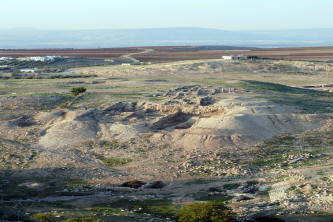
Arriving in Bitola is no walk in the park. The easiest way to get there is to fly into the capital city of Skopje and drive a few hours south. I took what I thought would be a shortcut which involved flying into Thessaloniki, Greece, then hopping into a taxi for a two-and-a-half hour drive. As my driver hurled the car down the road at a frightening pace, he would occasionally point out the window to something noteworthy and mumble. Once he said, “Left – look!” and pointed to what was Pella (rumored to be the birthplace of the Macedonian conqueror Alexander the Great).
Getting through the border is the real thrill; a difficult exercise for locals let alone foreigners. Don’t even ask a Greek or a Macedonian about the bitter struggle over land ownership; just be as cooperative as you can while a hungry German Shepard sniffs your nether regions. If you are respectful to the armed guard (and the dogs, of course, too) you should get to Bitola with a stamped
visa.
For a country that produced famous stars of the Ancient world such as Alexander the Great and the bloodline of the Egyptian queen, Cleopatra, Macedonia does not dwell on its tourism. In fact, in Bitola, there is little tourism whatsoever. There are entrepreneurs and there are ideas, but there are minimal resources. The lack of tourism explains the lack of English which means that if you don’t learn a little Macedonian you’d better become fluent in expressive gestures.
Locals would rather maintain their fruit trees and prepare for a cold winter than try to sell you postcards. As the European Union slowly gobbles up poorer countries, Macedonia’s entry is a long time off. Expectantly, their currency, the refreshingly pretty bank notes called denars, offer dirt cheap prices that resemble the Eastern Europe from a decade ago. The iron fist of Tito kept Macedonia strict: he was hostile to tourism and made it impossible for residents to leave. Fifty years ago a man and woman who were my grandparents did brave it past those German Shepards, barbed wire, and armed guards and snuck into Greece, eventually making their way to Australia.
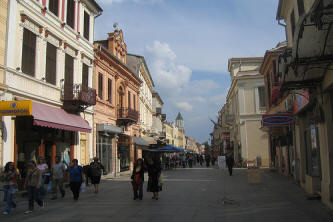
Unlike their Greek neighbors, Macedonians retain their own culture. Smoky cafes are frequented by Rakija drinking youth and burst with traditional — and often live — Macedonian music. Even though Bitola is Macedonia’s second biggest city, weddings are a joy and they are always a community affair. My Baba’s (grandmother) face lit up with joy as she described the festivities of a bygone Macedonia fifty years ago. “We were very poor, but if someone in the village had a wedding, oh, the feasts, the dancing! The whole village was invited!” A bride and groom celebrates nuptials with the community, and the community does not hold back; old ladies in their best suits toss coins and dance, and the youth drive by and honk their car horns.
Bitola’s Shirok Sokak (humbly translated as “Wide Street”) is filled with internet cafes, dark inns, and street food vendors similar to gyros (yet slightly different to avoid confusion with their Greek counterpart). There is some mystery here. Bitola was chosen to represent old Russia in the film, “The Peacemaker,” yet juxtaposed with this Orthodox grandeur are the many tell tale signs of the Ottoman invasion such as the many marbled ceilinged mosques around town.
My hotel, the Hotel Epinal, is on this main street. A five star hotel with a swimming pool, the hotel is out of place in Bitola. It doesn’t just seem out of place: it is. There are not as many souls staying here than working here.
Everywhere you walk down the street there are looks. Bitola is such a small town that my Macedonian looks did not guise me; locals knew who is local and who is not. It’s impossible not to notice the beggars that are around town — including gypsies. Exotic eyes — some chocolate, others sea green — size up suitable targets before an emotional approach. Gypsy following fashionistas who call themselves “boho” would find their silk aqua skirt has no place around the torn fabric on tanned skin gypsies of Bitola.
It wasn’t just the many homeless and beggars that I saw that tugged on my heartstrings, it was also seeing the tiny crumbling remains of my family roots. Had the man and woman who sneaked past the Greek border not been able to, they would have still lived at the crumbling stone cottage with an empty well. Jobs were either picking fruit or farming. If the fruit wasn’t ripe there was no income. Two apples fall from the same tree and suffer a very different life.
The apple that produced fruitful things was my Macedonian grandmother, Blagga, who escaped to Australia. She learned English, had a family, was a fish and chip pioneer in the early 1970s, worked in a clothes factory, and (by Macedonian standards) was rich and very successful. The other apple, Blagga’s childhood friend Zoba, lived the life that my grandmother (and ultimately I) would live had she not escaped. She married, had six children, picked fruit every day of her life, drew her own water from a well, and lived in the same small house all her life.
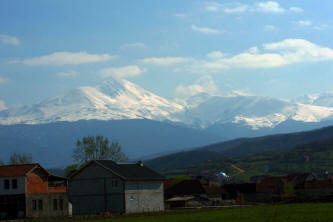
George, our taxi driver, drove to the Southwest so I could examine some of my old family houses. After passing two-storey brick houses and slum houses side by side, we found my grandmother’s childhood house: a mud and brick windowless hut. Granted, the dismal slum is on a lush grassy plain which looks up to surrounding mountains. Herethe air is fresh. The earby mountains — some spanning 6000 km above sea level — are snow capped even in the hot, dry summer.Next, I went to my grandfather’s cottage which was even more run down than the first, and it was covered in the inside by a thick veil of cobwebs. There was a keeper of the cottage: a matted dog who bared his teeth to ward off unwanted visitors. Ironically, these measures symbolized that the original occupant would never set foot there again. Having left illegally fifty years ago, my grandfather has never returned for fear that the Macedonian government would imprison him for illegal departure.
In Macedonia, change happens very slowly or not at all. The third cottage we went to was Zoba’s cottage, and it was more intact than the rest. A little lady dressed in a thick Romanian headscarf was sweeping her already clean veranda when my grandmother approached her. Zoba gruffly asked, “Who are you and what do you want?” When my grandmother’s identity had been confirmed, Zoba cried disbelievingly, “You same Blagga as my child friend!” She embraced her lost friend then kissed me on both cheeks. She wiped her palms on her apron, lit a cigarette, and led me inside a tidy kitchen. She then fed me like a cattle going to be slaughtered as the two old ladies held hands and laughed at jokes.
The charm of this old town is its people. Shop keepers are communicative and helpful and would risk their own financial detriment for a customer’s satisfaction. My sister made an unintended cheeky remark to one waiter. At the dinner table she tried to refuse a salad and said, “nesekum,” but with her pronunciation it sounded like she said, “nemesukus,” which means: “Do you not love me?” He laughed at her but looked happy that she at least tried. Another example was when a lady who worked at the hotel, unasked and begrudging of praise, not only laundered my clothes but also tightened a dress strap and sewed three buttons back on it for me.
The Bitola International Museum is a run-down, two-storey building with a small etching on its facade announcing its name. The museum houses an amazing array of treasures. Inside are some of the oldest Greek and Macedonian treasures — relics associated with the age of Alexander the Great. Outside the museum there is what looks like nothing more than a small patch of old grass, but on closer inspection of the ground there’s actually a 3000-year-old Greek depiction of the ancient world. Just two kilometers out of Bitola is Heraclea, an ancient site in Macedonia that was founded in the 4th century B.C. by Philip II. Excavators have discovered many remains from when this ancient site was a Roman city including: baths, porticos and a theatre.
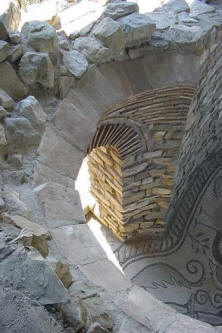
Even more obscure and off the beaten track is the rarely mentioned, hardly known, city of Stobi. Once the largest Roman city outside of Rome, Stobi is like the lost city of Atlantis but submerged under dirt rather than water. A two-thousand-year-old past hides most of Stobi’s incomprehensible antiquities under brown dirt, but most people don’t know what treasure lies underground. “If only,” thinks a Westerner as they envision excavations that would bring up mysteries of the Ancient World. Yet what is there to see is unmistakably dusty and casually awe inspiring. The buildings are there; high and proud, dusty and half unkempt, they are starved of attention. Even in peak season, there are no other souls (living that is) in this ancient city aside from the three lonely staffers working at the ticket kiosk.
An echo will resound around ruins that stretch for kilometers. Colorful mosaics in the christening room that have weathered 2000 years are still bright with only a few missing tiles. High Roman ceilings are supported by marble pillars, and Stobi is magnificent, yet hauntingly vacant. Visiting there I felt like a trespasser in an amusement park wandering around after hours.
Macedonians are loyal people and Bitola is full of them. For example, George, our taxi driver, loves his hometown and never wants to leave, though he admits that work is very slow. He has had offers from family abroad to sponsor him, but he is quite happy with his simple lifestyle. Macedonians may not have much, but what they do have they treat with pride and gratitude. An old man sells bureks, cheesy pies, and another man sells chestnuts; both treat their wares with the same respect as a celebrity chef. For the moment, Bitola seems safe from MacDonald’s. Enjoy it while it lasts.

The post Memoirs From Macedonia appeared first on The Expeditioner Travel Site.
]]>